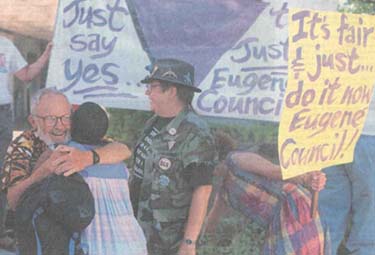
| Lane Home Page | Search Lane |
| Website Accessibility |

|
History: Online Exhibits
Peter Wotton served on the Eugene Human Rights Commission. Peter, on the left giving a hug, is shown outside a Eugene City Council meeting room after learning that anti-discrimination code changes protecting gays had passed. This is the subject of "Elderbery Wine" commentary #604 "Diversity" broadcast on June 27, 1994. Photo courtesy of The Register-Guard, Paul Carter photographer, July 12, 1994. Diversity Diversity has recently taken on a new meaning for me. I'm on the Eugene Human Rights Commission, and of course we often deal with this topic. In fact, we're right now publicizing proposed changes in the Eugene Civil Code, changes which would include sexual orientation and source of income among the catagories protected from discrimination. The new meaning of diversity I referred to has to do with ideas, opinions and mindset, rather than with different races, ethnic groups and lifestyles. Just as we hope that all races and ethnic groups and lifestyles will be welcome in our community, we also can hope that all points of view will be welcome. This was highlighted recently with the news that leaders of both sides of the gay rights debate had been meeting secretly to promote "more open, honest, respectful and productive" discussions. As a member of the elderly minority, I'm aware that many of my contemporaries have trouble accepting some of the major changes in our society. We were brought up in an era when homosexuality, even as a topic, was kept "in the closet." Most families may have had gay or lesbian members -- I know mine had at least one of each -- but they were considered "exceptions," and were not openly acknowledged. I recall discussing the subject recently with an 87-year-old woman. She was surprised at observing a wedding rehearsal for two women, and I said "You've been around a long time. Surely you know that there are men who love men and women who love women." Waving her hand in dismissal, she said "Oh -- but they're all crazy!" An elderly woman from the South asked me, "What was that colored man doin' at your party?" I'm reminded of a time in the nineteen-sixties, when group dynamics were just becoming recognized, when I sat in a group of ten people trying to decide which ones were really "part of the group." We had been together as a group for a total of about ten hours, in sessions of two hours each, and no one had chosen to leave the group, although that was an option. As I sat there, I had one of my relatively rare insights. I realized that we were all "members of the group." My only question was how each one of us was participating. One was very talkative, another very quiet. One tried to lead the group toward consensus, while another seemed to want to keep the group in a good humor. One even folded his arms and just glowered at the rest of us, never joining the discussion. But everyone in the group had stayed. After ten hours, it was clear to me that everyone "belonged." I think communities are a lot like that. Some people are pushing for change, while others resist it. Some are sitting there with their arms crossed, scowling. And some are trying to decide, as I was in that group, who "belongs" in the community and who doesn't. I think of this community as my home. And I like the definition of home as "where, when you get there, they have to let you in." This is Peter Wotton with Elderberry Wine, KLCC's weekly salute to the older people in our community. And my message for this week is: Everybody here is here. So we all belong. Copyright "Elderberry Wine" is copyrighted by KLCC-FM . Permission to rebroadcast or publish the commentaries must be obtained from KLCC-FM. |
||||||
>> Return to Lane's Home Page >> Return to Archives Main Page >> Return to top of page Lane Community College - Archives and Records 4000 East 30th Avenue, Eugene, OR 97405 Phone: 541-463-5466 Fax: 541-463-3996 Center Building, Rooms 18-19-20 Please direct comments about this site to archives@lanecc.edu Revised 11/9/05 (eu) © 1996-present Lane Community College |

 Diversity
Diversity